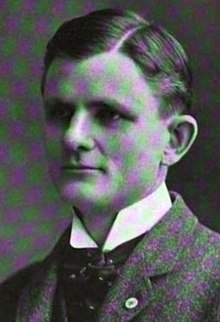Charles Edward Kiefner (November 25, 1869 – December 13, 1942) was a U.S. Representative from Missouri's 13th congressional district.
Charles E. Kiefner | |
|---|---|
 From Volume I of 1912's History of Southeast Missouri | |
| Member of the U.S. House of Representatives from Missouri's 13th district | |
| In office March 4, 1925 – March 3, 1927 | |
| Preceded by | J. Scott Wolff |
| Succeeded by | Clyde Williams |
| In office March 4, 1929 – March 3, 1931 | |
| Preceded by | Clyde Williams |
| Succeeded by | Clyde Williams |
| Member of the Missouri House of Representatives | |
| In office 1902–1908 | |
| Personal details | |
| Born | November 25, 1869 Perryville, Missouri, U.S. |
| Died | December 13, 1942 (aged 73) Perryville, Missouri, U.S. |
| Political party | Republican |
Born in Perryville, Missouri to German immigrants,[1] Kiefner attended the public school system. He engaged in the retail lumber business and also in road construction. Kiefner served as Mayor of Perryville from 1900 to 1902 and was a member of the Missouri House of Representatives from 1902 to 1908. He served as delegate to the Republican National Convention in 1912 and served on the staff of Governor Arthur M. Hyde from 1920 to 1924.
Kiefner was elected as a Republican to the Sixty-ninth Congress (March 4, 1925 – March 3, 1927). He was an unsuccessful candidate for re-election in 1926 to the Seventieth Congress. He was elected to the Seventy-first Congress (March 4, 1929 – March 3, 1931). He was an unsuccessful candidate for re-election in 1930 to the Seventy-second Congress. He resumed the lumber and banking business in Perryville, Missouri, until his death on December 13, 1942. He was interred in Home Cemetery.
References
edit- United States Congress. "Charles E. Kiefner (id: K000167)". Biographical Directory of the United States Congress.
- ^ "United States Census, 1880", FamilySearch, retrieved April 8, 2018